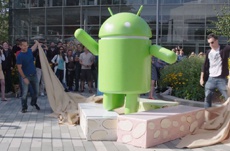
Despite all attempts to solve the fragmentation problem of Google with the problem is getting worse every year. According to Ars Technica, a number of very high-end smartphones like the Nexus 5 and HTC One M8 will not get the official update to Android 7.0 Nougat. The reason for this is quite simple: many smartphones will not update, not only because of the reluctance of manufacturers to support the device, but also due to the fact that Qualcomm has decided not to update the graphics driver for its Snapdragon 800 processor and 801 for compatibility with Nougat
.
the reason is that the graphics accelerator Adreno 330 does not support the latest API Vulkan, and Qualcomm agreed that once the chip is outdated morally, then keep it in the current platforms are not worth it. The problem is that the Snapdragon 800/801 processors installed in almost all the flagship 2014 and even some 2015 devices (many companies have chosen to remain on proven chips rather than use mixed Snapdragon 810).
The list includes known devices of almost all manufacturers. Among them, Google Nexus 5, HTC One M8, Sony Xperia Z3, Samsung Galaxy S5, Galaxy Note 3 and LG G3. Given the prevalence of Snapdragon 800/801, in reality, the list includes dozens of popular smartphones, which will not receive Android 7.0 Nougat. For comparison, the upcoming operating system iOS 10 will work on all iPhone models, starting with the iPhone 5, which debuted in 2012.
For owners of “guglofonov” situation with the inability to upgrade to Android 7.0 Nougat can not be called pleasant:. Many phones still have a sufficiently high output and theoretically capable of providing an excellent job with fresh operating system.
Along with vulnerabilities in security software, the problem of the operating system support to date is one of the main shortcomings of Android. Currently in use there are many Android-smartphone from different manufacturers with different functionality and different versions of the operating system. This complicates the work of developers creating applications for various systems, and poses a threat to security of the data. For example, in March of this year, iOS 9 share among mobile devices, Apple has reached 79%, while as fresh at the moment Android Marshmallow, released around the same time, were used by only 2.3% of devices.
According to the official Google statistics, almost 50% of all Android-devices run on Android KitKat 2013 and even older versions of the OS. It can be anything you want to talk about the benefits of the openness of Android, but it is this very openness often prevents the use of the newest features of OS and puts users at risk of device
No comments:
Post a Comment